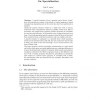Free Online Productivity Tools
i2Speak
i2Symbol
i2OCR
iTex2Img
iWeb2Print
iWeb2Shot
i2Type
iPdf2Split
iPdf2Merge
i2Bopomofo
i2Arabic
i2Style
i2Image
i2PDF
iLatex2Rtf
Sci2ools
132
click to vote
DAGSTUHL
1996
1996
What Not to Do When Writing an Interpreter for Specialisation
A partial evaluator, given a program and a known "static" part of its input data, outputs a specialised or residual program in which computations depending only on the static data have been performed in advance. Ideally the partial evaluator would be a "black box" able to extract nontrivial static computations whenever possible; which never fails to terminate; and which always produces residual programs of reasonable size and maximal efficiency, so all possible static computations have been done. Practically speaking, partial evaluators often fall short of this goal; they sometimes loop, sometimes pessimise, and can explode code size. A partial evaluator is analogous to a spirited horse: while impressive results can be obtained when used well, the user must know what he/she is doing. Our thesis is that this knowledge can be communicated to new users of these tools. This paper presents a series of examples, concentrating on a quite broad and on the whole quite succes...
Related Content
| Added | 02 Nov 2010 |
| Updated | 02 Nov 2010 |
| Type | Conference |
| Year | 1996 |
| Where | DAGSTUHL |
| Authors | Neil D. Jones |
Comments (0)

